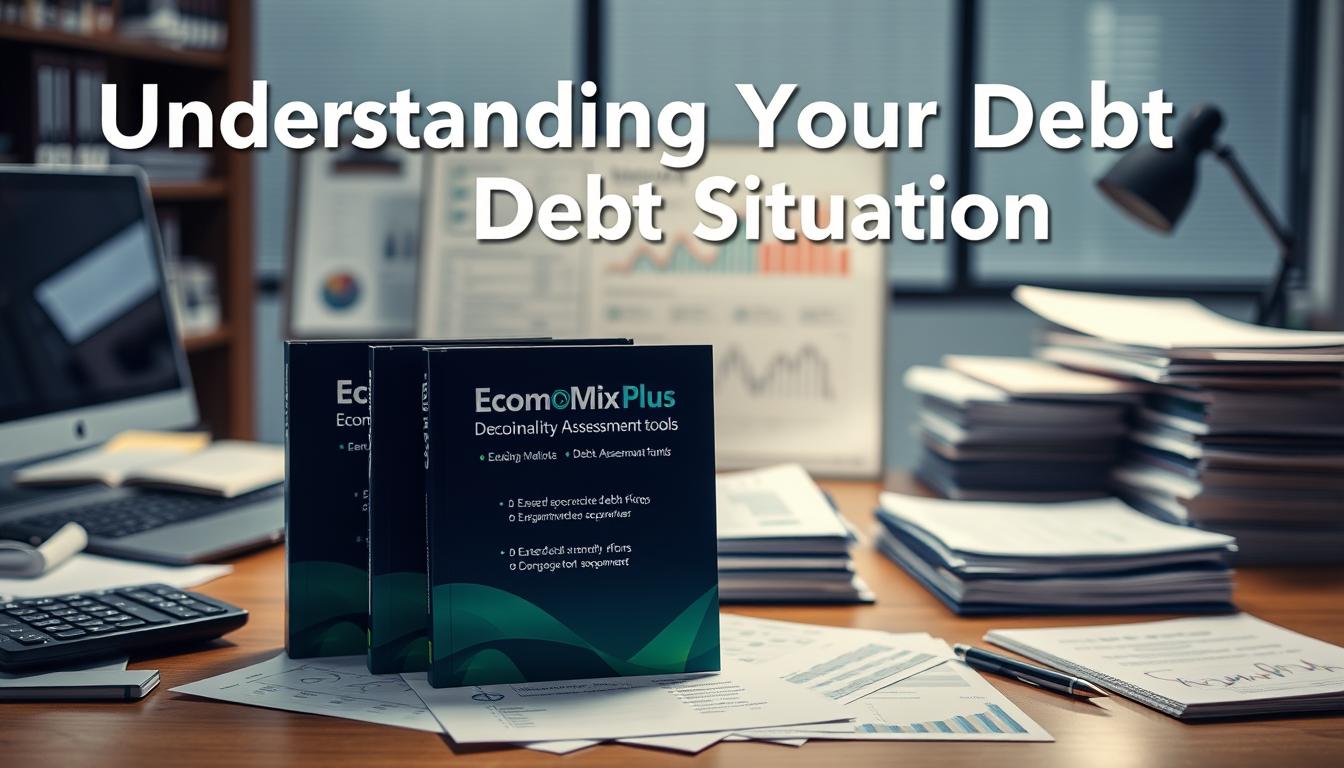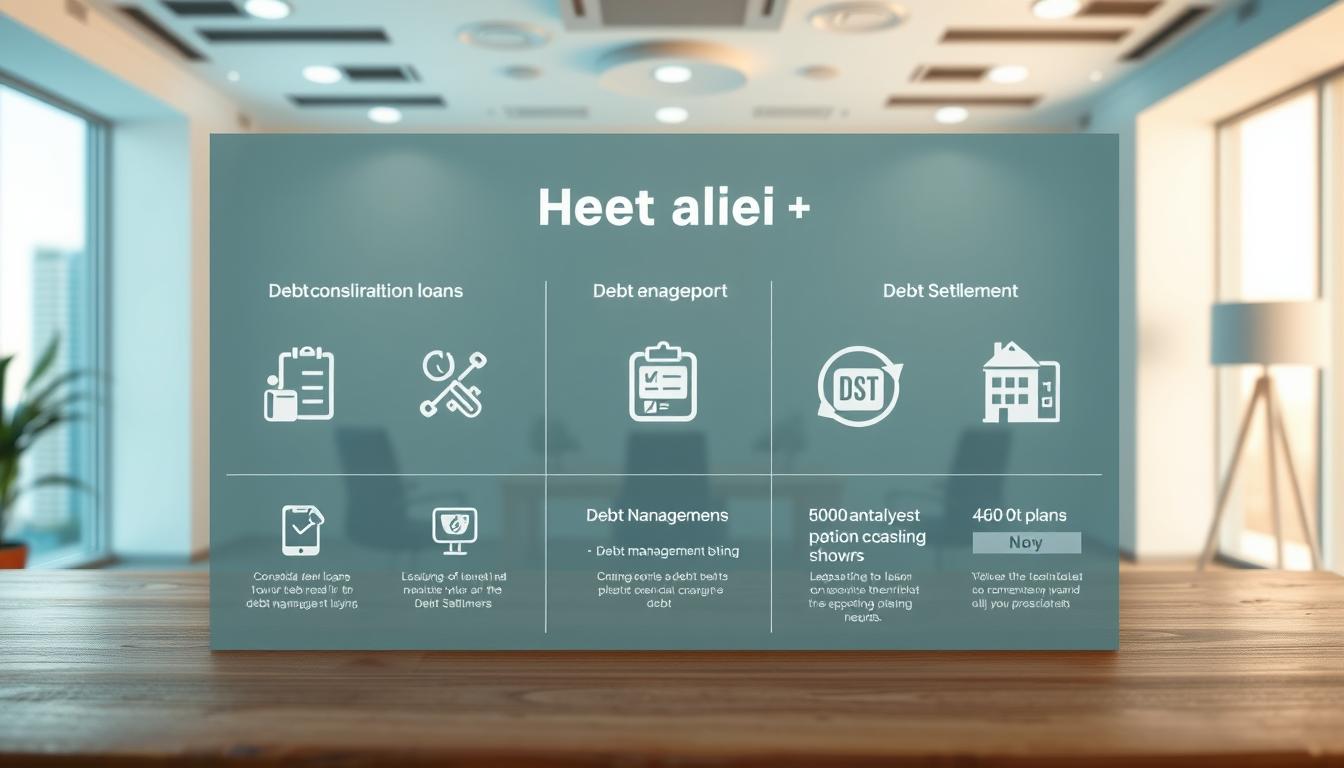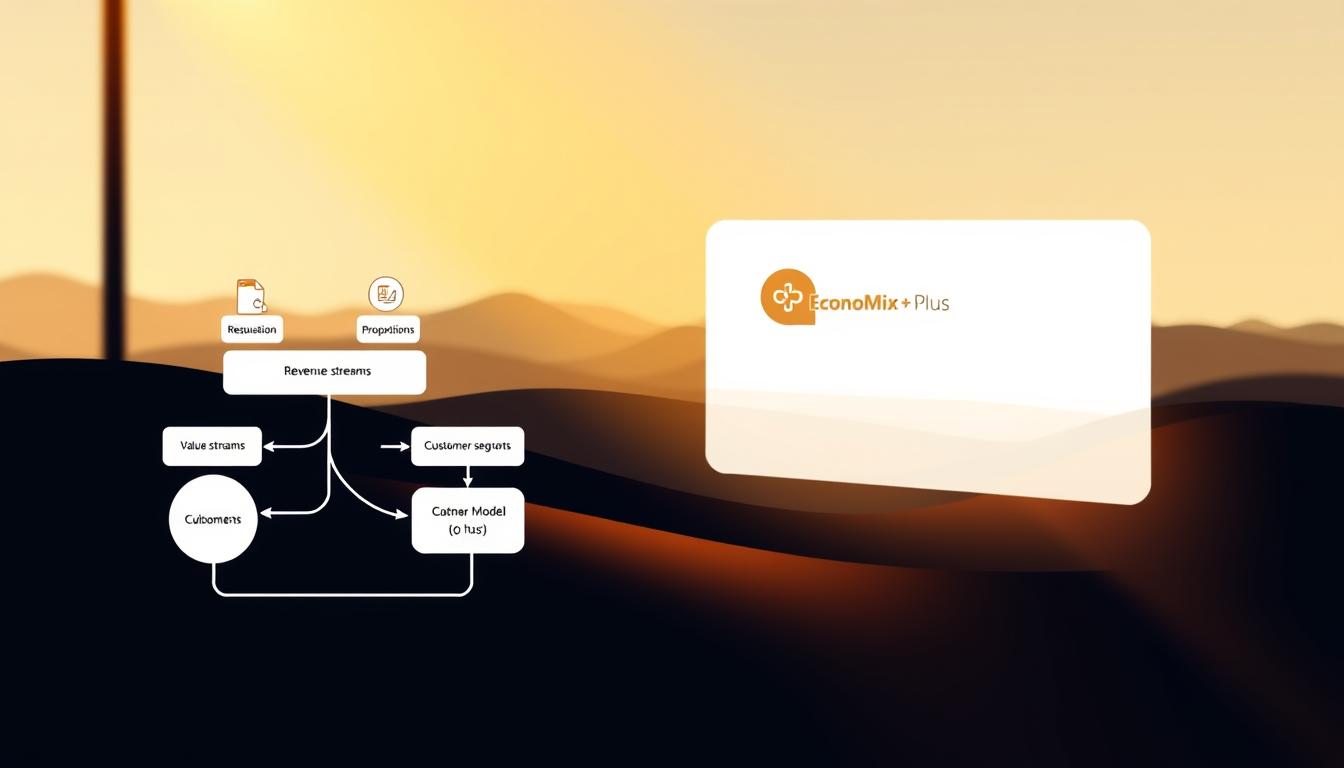Does opening your mailbox feel like facing a financial avalanche? You’re not alone. Millions juggle credit card balances, personal loans, and mounting bills that chip away at peace of mind. But here’s the truth: debt doesn’t define your future.
This guide cuts through the overwhelm with practical steps to rebuild stability. We’ll show you how to map your obligations, negotiate smarter terms with creditors, and create a realistic payoff plan. No magic fixes – just clear strategies backed by financial experts.
Why does this work? Successful debt relief combines numbers with mindset. You’ll learn to spot spending triggers while tackling balances methodically. We focus exclusively on proven methods like debt consolidation and settlement – no risky schemes or complex investments.
Key Takeaways
- Early communication with creditors prevents penalties and preserves credit scores
- Budgeting acts as your financial GPS through repayment
- Prioritize high-interest debts first to save money long-term
- Consolidation loans can simplify payments but require discipline
- Emotional awareness helps break the debt accumulation cycle
Understanding Your Debt Situation
Taking charge starts with seeing the full picture. Gather every bill, pay stub, and receipt from the last 30 days. This reveals patterns you might miss when scrambling to meet deadlines. Financial clarity comes from cold, hard numbers – not guesses or hopes.

Assessing Your Financial Picture
List all income sources first: salaries, side gigs, even sporadic cash flow. Next, track every expense – yes, even that $4 latte. Free apps like Mint or spreadsheets simplify this process. One user shared: “Writing down my weekly Uber Eats orders shocked me into cooking more.”
| Debt Type | Average APR | Common Fees | Flexibility |
|---|---|---|---|
| Credit Cards | 18-29% | Late fees, balance transfers | Variable payments |
| Personal Loans | 6-36% | Origination fees | Fixed terms |
| Student Loans | 3-7% | Deferment charges | Income-based plans |
Identifying Types of Debt You Face
Not all debts work the same. Credit cards often have crushing interest rates, while student loans offer flexible repayment. Medical bills might negotiate better than store cards. Sort obligations by:
- Interest rates (highest first)
- Minimum payments
- Potential penalties
Contact creditors if payments exceed 40% of your income. Many offer hardship programs, but you need to ask. As financial coach Maria Perez notes:
“Creditors prefer partial payments over collections – if you communicate early.”
Creating a Realistic Budget for Debt Management
Crafting a budget feels like building a roadmap through financial fog. Start by collecting every bill, pay stub, and bank statement from the past month. This concrete data reveals where your money actually goes – not where you think it goes. One study found 67% of people underestimate daily spending by $25 or more, which can impact their ability to pay debt or explore debt settlement options.
Steps to Build Your Budget
Begin with income sources: salaries, gig work, even garage sale profits. Next, list fixed expenses like rent and loan payments. Then track variable costs – groceries, gas, that streaming service you forgot about. Free tools like NerdWallet’s budget worksheet auto-categorize spending patterns.

Finding Areas to Cut Back on Expenses
Spotlight discretionary spending first. Could packed lunches save $150 monthly? Might carpooling reduce gas expenses by 30%? Financial coach Liam Carter advises:
“Treat every dollar saved as extra debt repayment power.”
| Expense Type | Examples | Avg Monthly Cost | Potential Savings |
|---|---|---|---|
| Fixed | Rent, car loan | $1,200 | 5-10% (refinancing) |
| Variable | Groceries, entertainment | $600 | 15-25% |
| Subscriptions | Streaming, gym | $85 | 50-75% |
Reallocate found money to high-interest credit card balances first. Even $50 extra monthly could shave years off repayment. Remember: A budget isn’t restrictive – it’s your blueprint for breathing room.
Struggling with Multiple Debts? Here’s How to Regain Control
When bills pile up, progress begins with one phone call or five-minute task. Start by listing every balance – seeing them on paper reduces their emotional weight. One client reported: “Crossing off a $500 medical bill gave me courage to tackle bigger debts.”

Overcoming Overwhelm with Actionable Strategies
Sort debts using the snowball method: attack smallest balances first while making minimum payments elsewhere. This creates quick wins that build momentum. For example:
- Call credit card companies to request lower interest rates
- Set weekly payment reminders on your phone
- Allocate $20 weekly from canceled subscriptions to debt
Financial advisor Rachel Torres suggests:
“Document every creditor conversation – dates, names, agreed terms. This paper trail protects you if disputes arise.”
Setting Priorities and Small Wins
Create a 30-day action plan with three focus areas:
- Highest-cost debts (credit cards over 20% APR)
- Flexible creditors (medical providers often negotiate)
- Daily spending leaks (unused memberships, delivery fees)
Track progress visually – color-code a debt chart or use free apps like Undebt.it. Celebrate paying off card debt under $1,000 before targeting larger loans. Remember: Consistency beats perfection. Missing one payment doesn’t erase months of effort.
Debt Relief Options to Consider Without Interest-Based Savings
Navigating debt relief options can feel like decoding financial jargon. Let’s simplify three proven approaches that avoid risky interest traps. Each path requires careful evaluation of your unique situation.

Exploring Credit Counseling and Debt Management Plans
Nonprofit credit counseling agencies like the NFCC offer free debt assessments. Certified counselors review your credit card debt and other obligations, then propose a debt management plan (DMP). These plans often negotiate lower interest rates with creditors, combining multiple payments into one monthly sum.
Weighing Debt Consolidation Versus Settlement
Compare options using this breakdown:
| Strategy | Impact on Credit | Time Frame | Cost Risks |
|---|---|---|---|
| Consolidation Loans | Temporary dip | 3-5 years | Higher rates if denied |
| Debt Settlement | Severe damage | 2-4 years | Tax on forgiven balances |
Consolidation works best for those with good credit seeking simplified payments. Settlement suits those facing extreme hardship but damages credit scores.
Staying Alert to Scams and Hidden Fees
Reputable companies never demand upfront fees before providing services. Watch for these red flags:
- “Guaranteed” debt forgiveness promises
- Requests for sensitive information via text
- Pressure to stop creditor communication
Financial attorney Lisa Harper advises:
“Always verify a company’s BBB rating before sharing account details. Legitimate help exists, but predators target the desperate.”
Negotiating with Creditors and Handling Debt Collectors
Mastering creditor negotiations transforms financial stress into manageable solutions. Start by gathering recent statements and payment records. Knowledge of your exact balances strengthens your position when requesting adjustments.

Effective Communication Strategies
Initiate conversations with clear objectives. Use this framework:
- State your intent to resolve debts respectfully
- Propose specific payment amounts (e.g., “I can pay $150 monthly”)
- Request written confirmation of any agreements
Financial attorney Darren Wright advises:
“Record call dates and representative names. Disputes often hinge on documented promises.”
If discussingdebt settlement options, clarify whether forgiven amounts might count as taxable income.
Understanding Your Legal Rights
Debt collectors must follow strict rules under the Fair Debt Collection Practices Act. Key protections include:
| Your Right | Collector’s Limit | Action if Violated |
|---|---|---|
| Validation Notice | Must send within 5 days | Request written proof |
| Communication Hours | 8am – 9pm local time | File FTC complaint |
| Harassment Ban | No threats or profanity | Record interactions |
Certified credit counselors from NFCC-approved agencies can intervene if negotiations stall. Their services often reduce credit card interest rates by 50% while creating sustainable payment plans.
Long-Term Financial Strategies for Sustainable Debt Freedom
True financial freedom starts when your savings outpace your debts. This requires balancing immediate debt repayment with future-proof habits. Let’s explore how to create lasting stability without relying on temporary fixes.
Building an Emergency Fund for Future Stability
Start by saving 5% of every paycheck in a separate account – even $50 monthly builds a $600 buffer in a year. Prioritize accessibility over growth: use a basic savings account instead of risky investments. Financial coach Elena Martinez explains:
“A $1,000 emergency fund prevents new credit card debt when unexpected costs arise.”
Pair this strategy with effective debt management plans to avoid derailing progress. Automate transfers to make saving effortless, treating it like a non-negotiable bill.
Rebuilding Your Credit and Financial Confidence
Timely payments impact 35% of your credit score. Set calendar reminders two days before due dates. Consider secured credit cards or credit-builder loans if your score needs repair – these tools report positive activity to bureaus.
Track progress with free services like Credit Karma. One user rebuilt their score from 580 to 720 in 18 months by:
- Paying medical bills under $500 first
- Keeping credit utilization below 30%
- Disputing two outdated collections
As your credit improves, explore better loan consolidation options to reduce interest rates. Remember: Financial health grows through consistent, small wins – not overnight miracles.
Conclusion
Financial recovery begins with decisive action. By reviewing your debt balance and crafting a tailored budget, you’ve laid the groundwork for lasting change. Choose strategies like consolidation or settlement carefully – what works for one person’s credit card debt might not suit another’s student loans.
Open communication with creditors remains crucial. Keep detailed records of every conversation and payment. Small steps – like redirecting $50 monthly toward high-interest debts – create momentum over time.
Rebuilding credit requires patience. Focus on consistent payments and smart money habits. Free tools from NFCC-certified counselors can help refine your approach without risky financial products.
Start today. Update your budget, contact one creditor, or research repayment plans. Lasting freedom from debt grows from daily choices, not overnight fixes. You hold the power to rewrite your financial story – one informed decision at a time.
FAQ
How do I prioritize which debts to pay off first?
Can I negotiate credit card debt on my own?
What’s the difference between debt consolidation and settlement?
How do I handle aggressive debt collectors?
Will a debt management plan hurt my credit?
How can I avoid debt relief scams?
Should I use savings to pay off debt?
FAQ
How do I prioritize which debts to pay off first?
Start by listing all debts, interest rates, and minimum payments. Focus on high-interest debts like credit cards first (the avalanche method) or tackle smaller balances for quick wins (the snowball method). Choose the approach that keeps you motivated.
Can I negotiate credit card debt on my own?
Yes! Contact creditors directly to request lower interest rates, waived fees, or payment plans. Be honest about your situation—many companies offer hardship programs. Document agreements in writing before sending payments.
What’s the difference between debt consolidation and settlement?
Consolidation combines debts into one loan or balance transfer card with a lower interest rate. Settlement involves negotiating to pay less than you owe, but it can hurt your credit score. Research both options carefully.
How do I handle aggressive debt collectors?
Know your rights under the Fair Debt Collection Practices Act (FDCPA). Request written validation of debts, avoid sharing sensitive info, and report harassment. Consider working with a nonprofit credit counseling agency for support.
Will a debt management plan hurt my credit?
Initially, it might cause a small dip, but consistent payments through a credit counseling plan can rebuild your score over time. It’s often better than missed payments or defaults, which cause longer-lasting damage.
How can I avoid debt relief scams?
Watch for red flags like upfront fees, guarantees of debt forgiveness, or pressure to stop communicating with creditors. Verify companies through the National Foundation for Credit Counseling (NFCC) or Financial Counseling Association of America (FCAA).
Should I use savings to pay off debt?
Keep a small emergency fund (even $500–$1,000) to avoid new debt from unexpected expenses. Use extra cash beyond that to target high-interest balances. Balance paying debt with maintaining financial safety nets.
How long does it take to rebuild credit after debt relief?
Timely payments and responsible credit use can show improvement in 6–12 months. Negative marks like settlements stay on reports for up to 7 years, but their impact lessens over time. Focus on consistent habits for lasting change.














